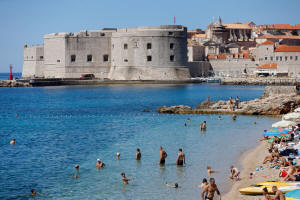Croatia tightens controls on Adriatic coast to safeguard tourist season
 Send a link to a friend
Send a link to a friend
 [July 23, 2021]
ZAGREB (Reuters) - Croatia has
decided to tighten controls against the spread of COVID-19 along its
Adriatic coast in an effort to safeguard its economically vital summer
tourist season, Interior Minister Davor Bozinovic said on Friday. [July 23, 2021]
ZAGREB (Reuters) - Croatia has
decided to tighten controls against the spread of COVID-19 along its
Adriatic coast in an effort to safeguard its economically vital summer
tourist season, Interior Minister Davor Bozinovic said on Friday.
"Any public gathering of more than 50 people will be forbidden from next
week," Davor Bozinovic, who is also head of the national civil
protection directorate, told a news conference in the capital Zagreb.
The exception will be gatherings of up to 1,000 people, such as for
concerts which would require all participants to show a certificate that
they are either vaccinated, tested negative for the virus, or have
recovered from the respiratory disease.

"Similarly, anyone who wants to attend any sports event will have to
meet those requirements," he said.
Croatia, with its stunning, rugged Dalmatian coast and chains of
islands, sweeping beaches, limpid seas and historic Venetian towns
including Dubrovnik, is a big draw for travellers from Italy, Germany,
Austria and central and eastern Europe.
Tourism accounts for 20% of Croatia's gross domestic
product. Despite continued travel obstacles caused by the coronavirus
pandemic, officials hope this year's season, now nearing its peak
period, can raise 70% of revenues seen in 2019.
[to top of second column]
|

People are seen at Banje beach in Dubrovnik, Croatia, July 28, 2020.
REUTERS/Antonio Bronic

In a further move to protect the tourist season,
Croatia this week introduced obligatory tests for arrivals from
Britain, Russia and Cyprus regardless of their vaccination status.
Wearing face masks remains obligatory in indoor public places and in
public transport.
On Friday, Croatian authorities reported 176 new cases of COVID-19,
up from 131 a week ago and 87 two weeks ago.
(Reporting by Igor Ilic; Editing by Mark Heinrich)
[© 2021 Thomson Reuters. All rights
reserved.] Copyright 2021 Reuters. All rights reserved. This material may not be published,
broadcast, rewritten or redistributed.
Thompson Reuters is solely responsible for this content.
 |